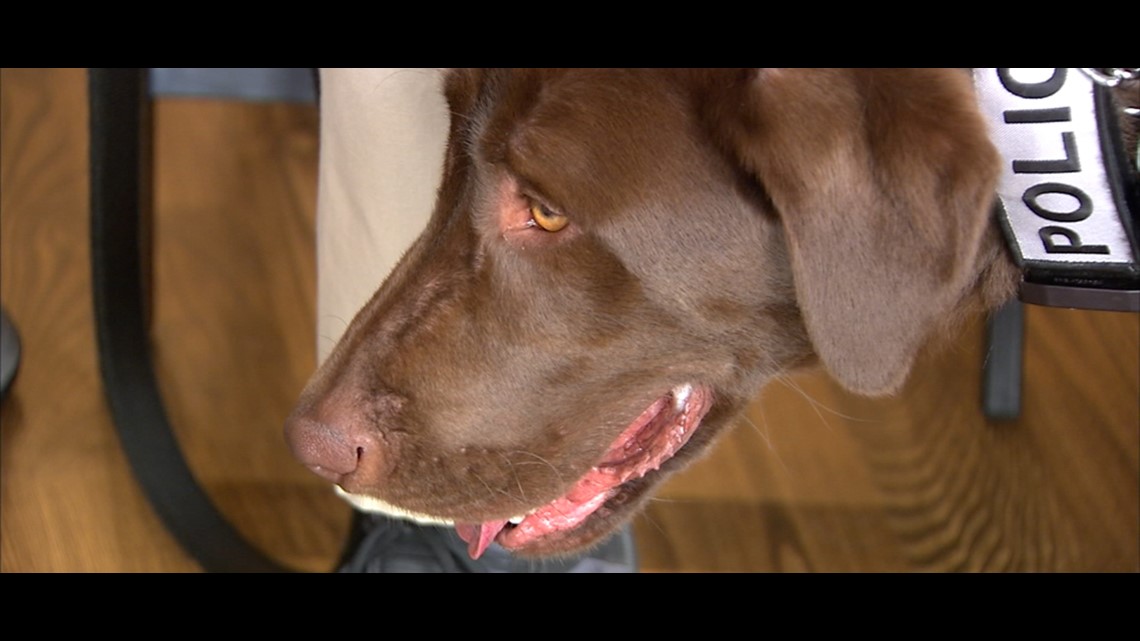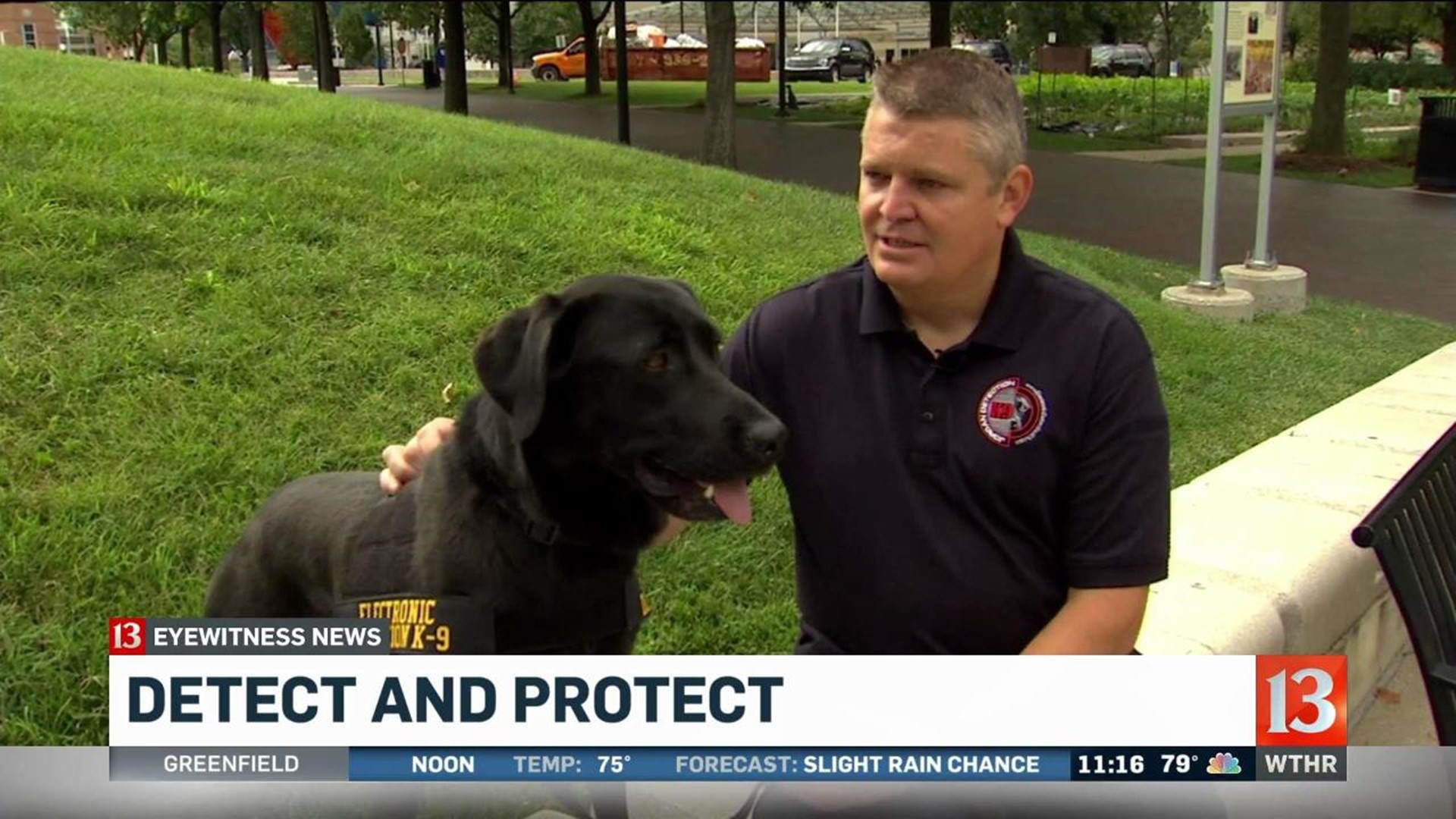INDIANAPOLIS (WTHR) - Labrador rescues trained in Indiana are helping investigators nationwide find key evidence against online predators.
The dogs use their keen sense of smell to detect trace amounts of a chemical compound, used in the circuit board of all storage devices. The devices vary and include cell phones, computer hard drives, thumb drives, SD cards. A micro SD card is about the size of a Tic-Tac. The tiny technology makes it easier for criminals to hide and harder for investigators to find. But the dogs are sniffing them out.
Officer Robert Givens travelled to Indianapolis to pick up Chip, a 2 1/2-year-old Labrador who just graduated from training and will be working with law enforcement in Vancouver, Washington.
"The best way I can put it is when we go in on a search warrant and we are looking for these small devices, it's like walking into a dark room and having the dog there is like the flashlight. He's going to help us find it," said Givens.
The devices contain evidence in cases of child pornography, child sex trafficking, child sex tourism, sextortion and live streaming of child sexual abuse.
Givens knows the dogs' added value. He has already worked with Bear, the first electronic detection dog trained in Indianapolis by Todd Jordan at Jordan Detection K-9.
"It is more often than not that Bear finds things that we miss or that we didn't find. He also helps us channel our search into the right locations" Givens said.
"You've got to remember that every image is a victim. And that means a lot when it is a child. If you have 80,000 images on one little micro SD, that is 80,000 victims...worldwide," said Jordan.
Jordan first tested his training with Bear here in Indianapolis and knew he was on to something when the dog aided investigators in two high-profile cases.


"Bear was utilized in the Jared Fogle investigation. The dog found evidence for that was instrumental in that case. A little while later he was called out on the Marvin Sharp case, the USA Gymnastics coach. He searched his house and facility and found devices there," said Charles Harsin with Neighborhood Electronic Detection K-9 Inc.
Harsin is a retired pharmacist and Jordan's father-in-law. As Harsin learned about the victims, the impact the dogs could make, as well as the budgetary beaurocracy involved in placing the dogs, he felt morally and socially obligated to act. With encouragement from his friends at Neighborhood Fellowship Church, Harsin created a non for profit to provide trained dogs to Internet Crimes Against Children Task Forces (ICAC) that meet specific criteria.
"Many of these people that do this training are frustrated because they come out of searches without finding devices and those are victims that are left behind. Our motto is 'No victims left behind.' We don't want to leave an SD card there with a child's image that is going to be plastered all over the internet. We want to recover that and stop it from happening again," Harsin said.
Harsin worries about the children and their increased risk of a derailed future. He's heard stories of victims later battling depression, committing suicide and pursuing prostitution and other destructive behaviors.
"Children get on chat rooms and in a moment of ignorance they will do something really stupid post a picture and then they are trapped. They don't know but usually when they do this there are people all over the world watching them and they will extort them. You can't get out of it, your image, if you put it out there, is out there in perpetuity forever. It's out there in the low-income neighborhoods; it's out there in the wealthy neighborhoods. People just aren't aware the extent of the problem," Harsin said.
Agencies wanting an electronic detection dog must apply and agree to a recommended training, care and maintenance routine. Harsin's 501(c)(3) covers the $11,000 training and maintenance fees for dogs they've placed. By the end of next month, Jordan will have placed 13 K-9s. He estimates there are roughly 30 dogs doing this work nationwide.
There is growing demand.
Jordan is trying to figure out how to expand the number of dogs he's graduating without compromising the quality of his training. Law enforcement handlers assure Jordan, his work is making a difference.
"They said that all the time...the search warrants that they did...after the investigators left, the dog would come in and they would find something that they missed. So the dogs are definitely showing and proving themselves out in the nation," said Jordan.
What can you do?
- Talk with your children. Make sure they are aware there are predators posing as peers online.
- Monitor your child's online activity to ensure he or she isn't sharing images of him or herself. Be diligent.
- If you have a Labrador retriever, consider donating it to Jordan Detection K-9.
- Finally, consider funding a group, like Neighborhood-Electronic Detection K-9 that places these specially trained dogs with Law Enforcement and Internet Crimes Against Children Task Forces around the country.
To learn more about Neighborhood Electronic Detection K-9 Incorporated, go to NeighborhoodK9.com or call 317-340-6985.

